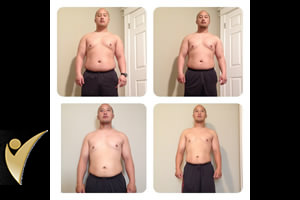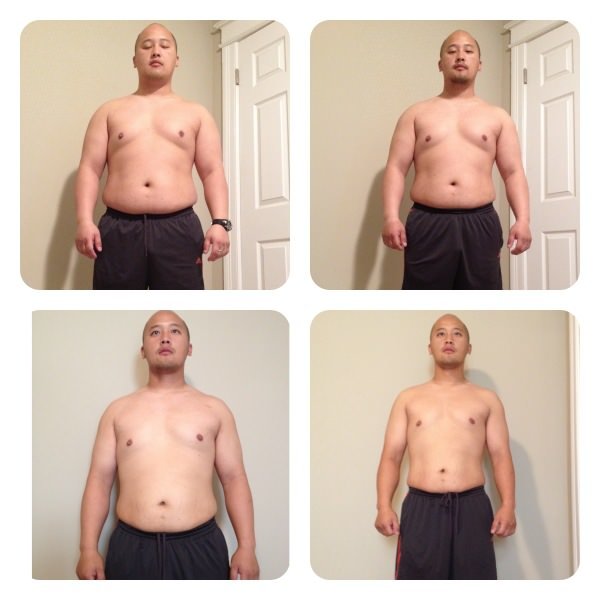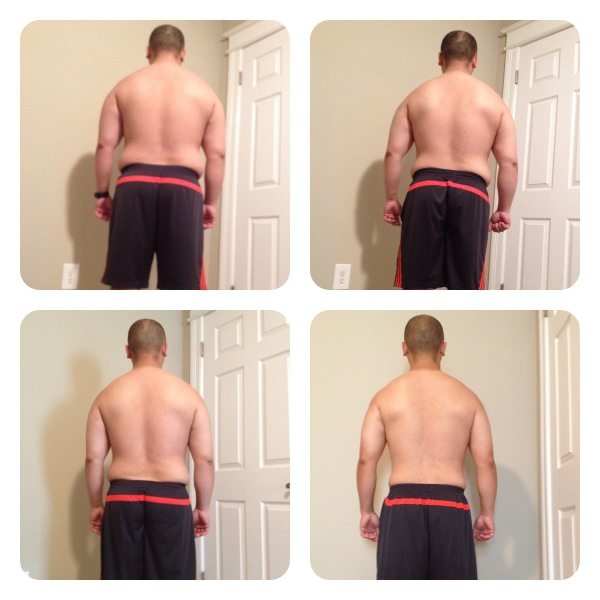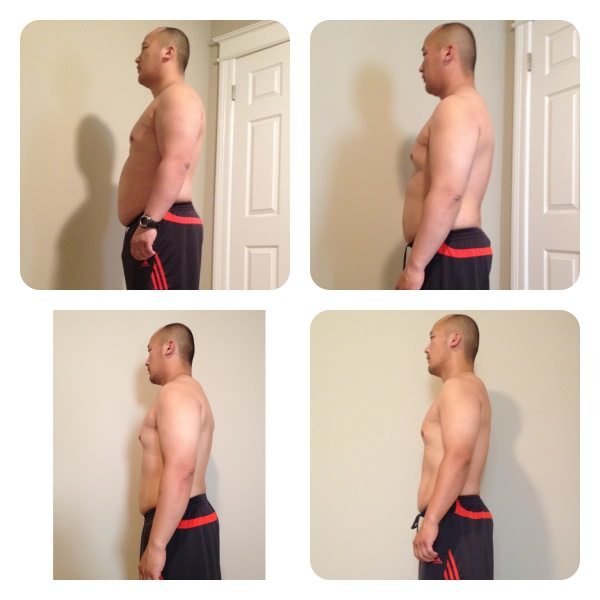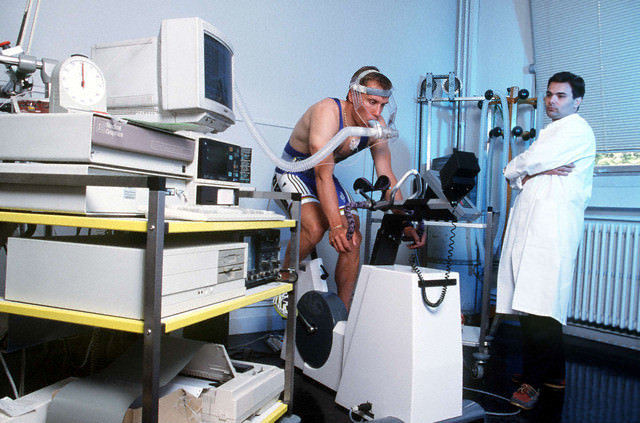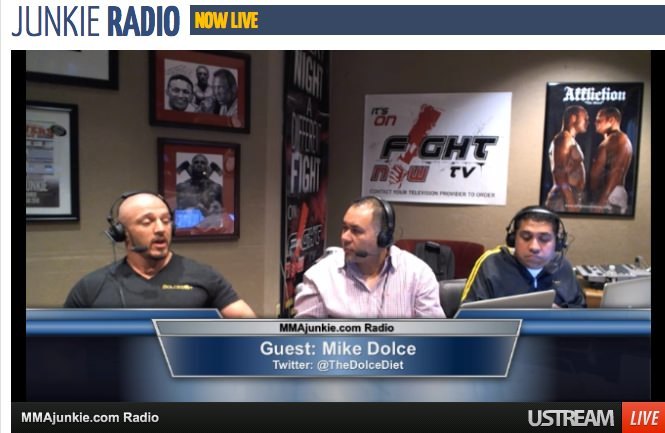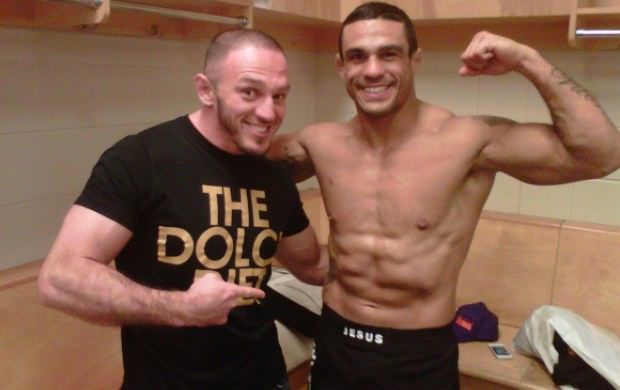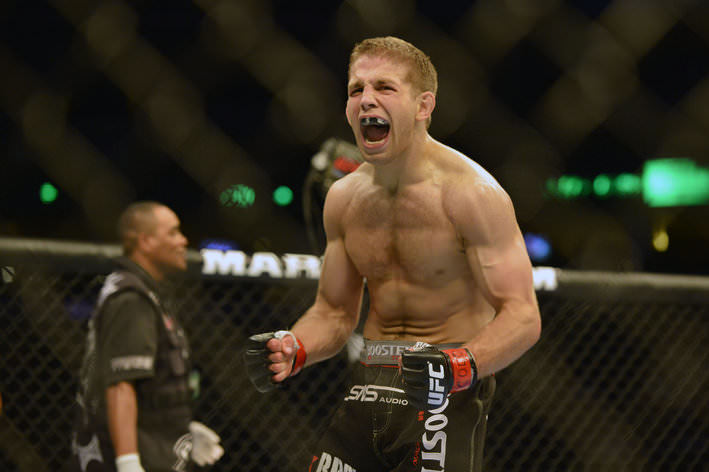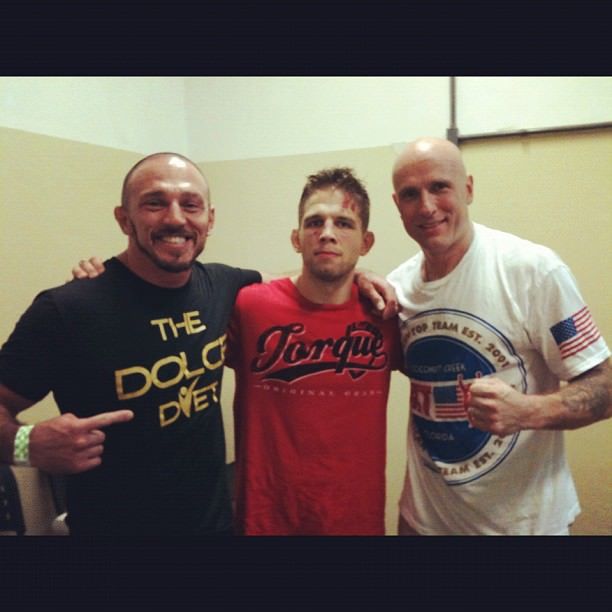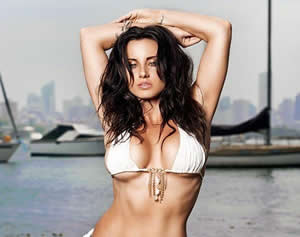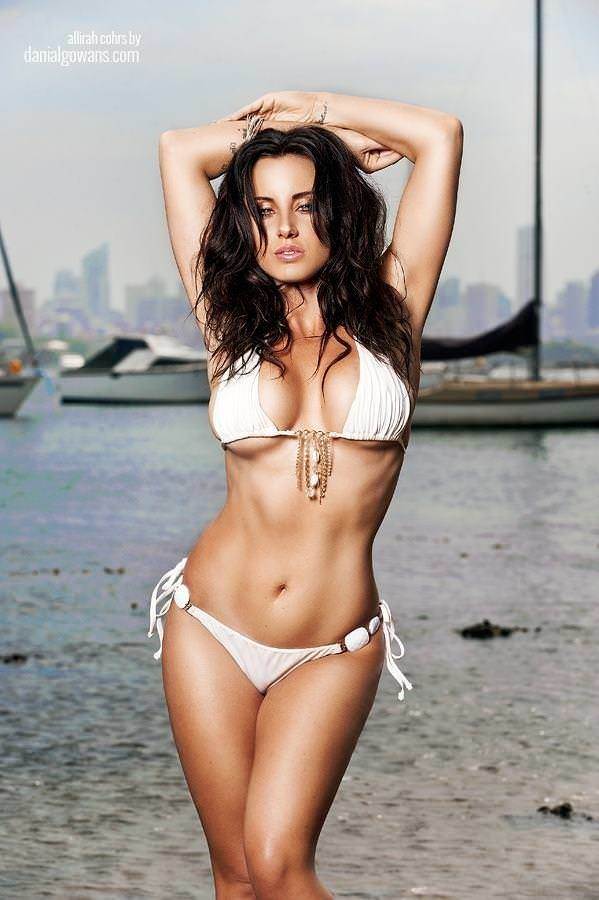MIKE DOLCE BREAKS DOWN TRT AND ITS PLACE IN MMA
BY BEN FOWLKES ON JAN 29, 2013
As readers of my columns already know, I’m no fan of testosterone-replacement therapy (TRT) for professional fighters. The prevalence of TRT in MMA seems like a dangerous loophole to me, and one I suspect we might look back on with horror and embarrassment in the coming years.
That’s why I was surprised when Mike Dolce, the noted nutrition and weight-cutting consultant to the MMA stars, voiced a passionate support of TRT on the MMAjunkie.com Radio (www.mmajunkie.com/radio) show and on his own podcast last week. I’ve known Mike for years and have always respected his opinion, so I called him up to find out how a man whose philosophy shuns supplements in favor of food could possibly think testosterone injections for pro fighters is a good idea.
What follows here is part interview and part debate, but mostly a conversation between two people who will probably never agree on this issue, but can still find common ground for a productive discussion on it.
FOWLKES: One of the things that seems odd about the current TRT situation in MMA is how many guys – and you’ve worked with some of them – suddenly claim to need it. We’re talking about a powerful hormone that is essential in helping people become big, strong, explosive athletes in the first place, and now all these big, strong, explosive athletes say they have chronically low levels of the very hormone they’d need just to get to this point? It seems like either this sport is lowering people’s testosterone the longer they stay in it, or else they don’t really need it in the first place.
DOLCE: I’m with you 100 percent. That’s why I think the list of the criteria to enter into the TRT program should be extremely stringent. But the athlete’s need, the patient’s need, in some cases is legitimate. Those are the guys I believe are stepping up and they’re risking the public scrutiny by saying, hey, I’m doing this because my doctor says I should and the athletic commissions have legal remedies to allow someone in my situation to do this. The guys who are actually speaking up and being above-board with it, I don’t think they should be vilified. That was really the point of my rant on the podcast. They shouldn’t be vilified. They’re coming forward, letting their blood be reviewed by multiple agencies and entities. The media can be skeptical, but they’re being above-board about it and then they’re just getting kicked in the nuts.
I think that’s the wrong way to go to truly clean up the sport. I think there should be tremendous oversight. I believe guys in the TRT program should be tested every four weeks, 12 months out of the year. If you’re in it, you’re in it for life. You get tested year-round, and if you’re above you get suspended. No fine, just straight to a safety suspension for four months, which seems like a good starting point. And while you’re suspended, you should still have to produce four months worth of blood work before you’re allowed to compete again. Because there are guys with a legitimate need, and they’re the ones getting vilified.
FOWLKES: You mention being in the program for life. If we look at a guy like Nate Marquardt, who made that same claim everyone makes, saying his levels were low according to his doctor, got a legitimate prescription, all that. But then when it caused him some career problems, he got off it. Doesn’t that just prove, at least in his case, that he never really needed it? If you can be off of it and still compete at that level, how legitimate could the need have been?
DOLCE: I’m not a doctor and I don’t have access to his blood work or health history, so I’m just going to speak from an outside perspective. I believe Nate stopped using it based on the external, not because of how it made him feel or his blood work – all the internal stuff. He stopped, I think, because of all the extra baggage and the media scrutiny. That’s exactly what I’m talking about. He became vilified and left a medically sanctioned program because it was just easier. I’m assuming that Nate did everything above-board, that it was all legitimate. If it was legitimate and if it was agreed to by the commission, why shouldn’t he be allowed to do it? He got off it, which I would argue makes him less healthy now. Now he could be at risk, and look at his last performance. He had a sluggish, poor performance against [Tarec] Saffiedine, who’s amazing. A fight’s a fight, but that one additional point against him, I could say that did him a disservice.
FOWLKES: But OK, so say he looks sluggish because he’s not injecting testosterone. Does that alone make it justifiable? What’s the worst that happens to a fighter with legitimately low testosterone levels if we don’t allow him to artificially raise his levels?
DOLCE: It’s not just athletes; it’s humans. A decline in testosterone creates a whole array of physical, mental, emotional issues. Those are well-documented, more than I could give service to in this conversation, but things like depression are very common. Fatigue. Increased likelihood of injury. Those are all very high up on the list, and that’s not good if you just feel like crap every day, not so unlike a diabetic who goes without insulin. Something happened to you to make your hormone levels that way. Now, whether it was self-caused or not, that’s tough to prove. But for whatever reason, their body is not producing this essential hormone that allows them to feel good and operate at a normal level. Never should anyone be above normal. Guys in the TRT program, they’re sub-normal, not just for their own reading, but for all men in their age group.
FOWLKES: The issue of the root cause, though, seems especially problematic. As you mention, it’s tough to prove what caused it, but one thing we know is that abusing performance-enhancing drugs can cause this. If you abuse steroids or testosterone and then get off of it, your hormone levels plummet. How do we know, when we look at somebody applying for TRT, that we aren’t looking at someone who has done this to himself? Doesn’t that matter?
DOLCE: It does matter. Unfortunately, it would be very hard to go backwards on that. Very hard. But we can start moving forward by doing those four-week blood tests to see how his levels change. It’s hard to determine the root cause. It could be from excessive weight-cutting, which is not uncommon. It could be from concussive blows to the head, which is another thing that can cause hormone levels to go down over time.
FOWLKES: Let me stop you right there, with the point about concussive blows to the head. It seems like an insane argument to say, well, this guy has suffered so much head trauma as a fighter that we must allow him to inject testosterone in order to allow him to suffer more head trauma as a fighter. That’s crazy, isn’t it?
DOLCE: I agree, and that’s something I’ve said before, is that all fighters should get a CT scan immediately after every fight. We need to see, are there any spots? Is anything changed? That should be done immediately after the fight, not when they start forgetting their kids’ names or slurring their speech. I’m a big advocate of fighter safety. I only want healthy people in this, and that’s why I talk about TRT. I want us to be as healthy as we can be due to both lifestyle and the advances of modern medicine, which we just can’t deny. But we should do it with the least amount of medicine and doing as much as we can through lifestyle.
FOWLKES: But then there’s the issue from the other side, from the guy who’s not on it but has to fight a guy who is. You’re a fighter. You know what it’s like to stand in there and look across at some other guy who’s there to hurt you. Would you want to be in there with a guy who had been injecting testosterone for the last few months while he got ready to fight you?
DOLCE: You know, in the gym we train with guys who are taking a hell of a lot more than TRT. I would much rather myself, or my athletes fight a guy in the TRT program, because at least then you know he’s being monitored by these agencies and I know exactly what he’s doing. The guy who’s not in any program but is trying to fulfill a need in a different way, who knows what he’s doing? That guy’s scary, because he’s doing it in the dark. I want it to be above-board. And the amount of testosterone these guys are taking, it’s a relatively minuscule amount because they cannot exceed normal. That’s another point I made on the podcast.
FOWLKES: But what Nevada defines as normal is as high as 6-to-1 for a testosterone-to-epitestosterone ratio. Most people are at 1-to-1. Most other states do 4-to-1. So it seems like if you’re a normal guy walking around at 1-to-1 and you go up to 4-to-1, you’re still under normal in Nevada, but that’s four times what you started with. That seems like the definition of performance-enhancing.
DOLCE: As I understand it, that’s not the criteria that the commission and the doctors use. I understand – and I’m not on the commission, but this is what I get from the fighters and their teams, since it affects what I do – but it’s a different number. I believe it’s their total testosterone level. It’s what’s actually inside their body, regardless of the ratio. I believe that number, the high end is around 800. I believe that guys below 300 are the ones considered for the TRT program. Some of those guys are in the low hundreds. That gives you an idea how low they are. I think the ratio, as I understand it, is not used to determine inclusion in the program. That just opens them up for further testing as an initial flag.
FOWLKES: Yes, that’s true, the ratio is not how they determine whether you should be allowed to use testosterone, but it is how they look at your drug test sample to determine whether you’re over. They look at that ratio and that flags you as positive for elevated testosterone levels. That’s how Chael Sonnen got caught. That’s how Alistair Overeem got caught. What I wonder with you is how you square TRT with the rest of your philosophy, because I know your approach is so holistic and food-based. As you told me once before, the first thing you do when you come in to work with a new fighter is to get rid of “the powders, potions and pills” that they might be on as far as supplements and the like. It seems to me that that approach and the approach that says, hey, some guys need injections of synthetic testosterone, those two things seem in direct opposition to one another.
DOLCE: It’s no different than injecting insulin if you need it. I see the science, I see the medical need, I don’t see it as anything different than insulin. In fact, insulin is much more of a PED. There’s a lot of research on that. Insulin can be a major PED, and that’s easy to get and take. That’s no problem. Look at bodybuilding, and it’s everywhere. Testosterone, I think, isn’t in the same category. There should be a stringent program to determine and monitor who does it and how they do it. I’m not saying that everybody should get on testosterone. But the guys who need it shouldn’t be vilified. That’s my main point. These guys are giving their blood work. Think about it, you can’t ask for someone’s blood work. That’s one of the most private things in the world. These guys are willingly giving it.
FOWLKES: But they’re giving it to a state athletic commission, and one of the major issues I have is with the competency of those commissions to deal with something like this. I don’t know if you’ve heard when the Nevada State Athletic Commission reviews applications for therapeutic-use exemptions, but they use a doctor who is not an endocrinologist. This isn’t even his field. And plenty of fighters, they get these prescriptions in the first place from their personal doctor, who is not an endocrinologist. I’ve heard of fighters who got them from spine specialists. People aren’t seeking out the experts on this stuff. If we’re looking to the athletic commissions to tell us what’s justified and what isn’t, I don’t know how much faith we should really have that these commissions are even qualified to do this.
DOLCE: I agree. By and large, the commissions, the government agencies, the bureaucracy, they do a terrible job. As individuals, the commissioners themselves are good guys doing the best they can. But the agencies get absolutely nothing done. I mean, look at the judging. My mother can tell a bad call, and that happens all the time under the commission’s oversight. They have no criteria to fix it. People’s careers are on the line, millions of dollars, and this happens. But with the TRT program, I agree, the most brilliant minds in the field should be attached to this. It seems like a simple issue. I say everyone should be tested more, let’s find out what everyone’s issues and intentions are, and let multiple agencies with different agendas oversee it and determine if it’s good or not. I think it’s important so that the fans know the doctors, the commissions are all on the same page. No one’s stepping up to do it, but the guys who are coming forward and being public about their use, they don’t deserve to be vilified because of that.
FOWLKES: What I wonder is, since we’re talking about a violent combat sport where the consequences could be so dire – I mean, we’re not talking about baseball here, where the worst thing that happens from PED use is you hit a ball farther or throw it faster – this is people hitting each other in the head. At what point do the risks of allowing it outweigh the benefits to the few who need it? If we had to let a few fighters’ low testosterone go untreated, would that be worth it to ensure that other fighters aren’t risking brain damage by being punched in the head by people who are on this powerful hormone?
DOLCE: The question of combat sports is difficult. It is different. When we’re talking about combat sports or football or rugby – even NASCAR – the athletes assume a specific risk. That drives the sport. People watch for the risks, for the crashes, for the contusions. Good or bad, that’s the risk, and these athletes know it. They’re signing up to hurt and be hurt. The TRT program, with proper oversight, I don’t believe will adversely affect the opponent’s probability of getting hurt, or getting hurt worse. If anything, I think it would protect their safety more because of the oversight and regulation. I mean, it’s still punching and kicking at the end of the day. It’s a rough business.
FOWLKES: But say you’re a young guy who wants to be a pro fighter. Say you’re 22, maybe you’ve had a couple pro fights, and you dream of getting to the UFC. You hear about all these UFC fighters on testosterone – more and more lately, it seems, and we always seem to hear about it after they fight rather than before – but how are you not going to feel like, even if you don’t want to, you might have to do this stuff just to compete at that level? Doesn’t that seem like the really pernicious part of it, the way it makes the guys who want to compete clean feel like they can’t?
DOLCE: Yeah, that’s a good point, and that’s part of a whole other conversation. That’s part of why I talk about it, because we need to talk about this in the open and be honest. The kids out there in their teens, whether they’re just trying to gain weight because they’re sick of getting bullied, or whether they’re pursuing a career in mixed martial arts, guys at that stage of life just want to get bigger and stronger. We need to communicate to them that drugs are the wrong way to go. There are so many natural processes happening at that stage of life. The guys that take drugs ruin it, and they will end up needing something like the TRT program down the road. Don’t shut off your own supply.
FOWLKES: Last question: I don’t know how closely you follow other sports, but in the recent voting for the Baseball Hall of Fame, no one was elected. Several players from baseball’s “steroid era” were eligible, but looking back at them now it seems like baseball is shutting those guys out, maybe due to a collective sense of shame of what went on there and how long it was allowed to go on unimpeded. Are you not worried that we’re in that same kind of era right now in MMA with all this TRT? How many high-profile fighters need to be on TRT before we get to a point that will embarrass us when we look back a few years from now?
DOLCE: I agree, but I think we might feel that way about insulin, which nobody is doing much about, regardless of its powerful anabolic effects. …Insulin is the most powerful anabolic agent in existence. Testosterone is its less powerful younger brother, truly.
FOWLKES: But that’s like saying that because one substance is poorly regulated, we shouldn’t worry about other substances. If we aren’t doing enough about insulin, that does not form an argument for doing less about testosterone.
DOLCE: We should do more about everything. That’s what we could do if we have them submit a complete blood panel every four weeks. We need to know, are you a robot or not? Are you a real, legitimate, healthy athlete? Are you healthy for your own safety? Then we could catch some of these other issues, things like kidney problems from tough weight cuts. I wish the commissions and everyone else would jump on board. The blood work is not that expensive, not to make sure everyone is healthy. I think the only thing we can do here is move forward with proper oversight and regulation. I don’t think it’s possible to go backwards.
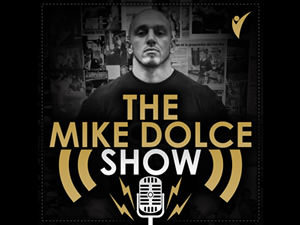
![]() In Episode 10, Mike takes us behind the scenes of The Ultimate Fighter Season 17 and Uriah Hall’s huge knockout of Adam Cella; and as always, he answers your questions! Topics include weight loss myths, why Mike doesn’t believe in counting calories, carb backloading, intermittent fasting, healthy weight gain, power lifting, strength training, romantic Valentine’s Day menu, lentils, bodybuilding, sugar-free products, sugar-added products, Subway food, almond butter, raw nuts or roasted, all-juice diets, cleanses, detoxes, cardio vs. strength training for building muscle, sports salaries and we announce the winner of the UFC 156 Pick’em Contest! Additional Media Here is the New York Times article Mike talks about in Episode 10 Myths of Weight Loss Are Plentiful, Researcher Says
In Episode 10, Mike takes us behind the scenes of The Ultimate Fighter Season 17 and Uriah Hall’s huge knockout of Adam Cella; and as always, he answers your questions! Topics include weight loss myths, why Mike doesn’t believe in counting calories, carb backloading, intermittent fasting, healthy weight gain, power lifting, strength training, romantic Valentine’s Day menu, lentils, bodybuilding, sugar-free products, sugar-added products, Subway food, almond butter, raw nuts or roasted, all-juice diets, cleanses, detoxes, cardio vs. strength training for building muscle, sports salaries and we announce the winner of the UFC 156 Pick’em Contest! Additional Media Here is the New York Times article Mike talks about in Episode 10 Myths of Weight Loss Are Plentiful, Researcher Says